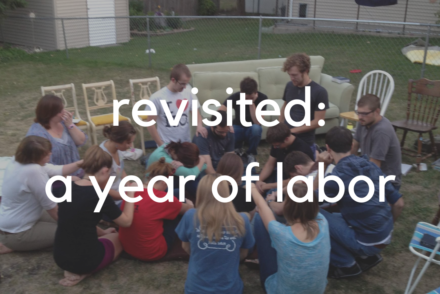This August will mark 9 years of leading Threshingfloor Communities, and approximately twelve years of leading (in various capacities) young adult and college ministries. A lot’s changed in that time, both for me personally and in the culture that the young adults and students we do ministry with live in.
On one hand, 18-30 year olds have the same basic needs as any other human – needs that can all be fulfilled with the same grace and truth found in God’s word and Gospel community for every age and stage of life. However, there are some unique challenges that come up when working with young adults. Here are four that I’ve encountered consistently over the last decade, and the most effective ways I’ve found to address them.
Diversified means of communication
When I started in YA ministry, Facebook was at its peak. Most 18-30 year olds were checking it a half-dozen times a day, paying attention to every notification they recieved. We could create an event on the network, send a message, or make a post and be confident that 80+ % of people would see it. If twenty people responded “attending” to an event we would expect 30 to come.
Now it’s nothing like that.
Communication means have diversified significantly, and the number of notifications an individual receives has multiplied exponentially. The average young adult has about 9 different social media accounts on various platforms. That means it’s a challenge to communicate to everyone in your ministry and those you want to reach on the fringes.
When I create a Facebook event today I expect about four times as many people as respond “attending” to actually show up because 3/4 of people simply don’t pay attention or even check the social network. Those who do check their networks of choice religiously often don’t pay deep attention to what they see.
Solutions:
- Make communication intentionally an “insider” thing by requiring people to get a specific app or tool to receive info. While this may mean that a smaller audience is on board with the communications you send out, it means that those who receive it will be more likely to actually remember it since it’s something exclusive.
- Texting is your best bet for easy mass communication. But don’t expect a response, or for most people to remember what you texted them three days later.
- Leverage word-of-mouth. Face-to-face and word-of-mouth communication have always been the most reliable means of telling people something. If you have something you want peopel to remember or commit to, make it a face to face, personal conversation and encourage people to pass it along.
- Repetition is essential. With the massive amount of mental and social noise in most young adult’s lives, repeated and varied communication paths are the most effective way to make sure you’re actually heard. When Threshingfloor has an event that we really want people to be aware of we try to hit three paths of communication – social media (generally Facebook and Instagram), mass text to the group, and a personal face-to-face or phone call invitation.
Lack of commitment
I’ve written before about how “maybe” is one of the most common answers you’ll get when inviting YA to an event. Getting 18-30 year olds to fully commit to something is often a struggle.
On one hand there are people who have too many things they’re casually committed to (work, school, sports leagues, hobbies, a variety of friend groups, and more), on the other hand there are people who struggle to commit to anything fully because they don’t know how long they’ll be in their current location.
Solutions:
- Start with the vision. Someone spray-painted the phrase “I follow dreams, not rules” on an alleyway in downtown Fargo. That phrase captures what seems to be the attitude of many young adults. If you can give them a glorious, God-filled vision they’ll give and invest deeply. Give them a taste of the vision and why they are essential to helping make that vision a reality.
- Focus on the core, not the fringes. Take the advice from Jesus and focus on a smaller core group rather than trying to build commitment in the fringes. Jesus had twelve disciples and around them a group of about 72 that he invested more deeply in than he did with the masses. Focus on the core.
- Make a face-to-face, personal ask for their commitment. Jesus specifically, personally picked out the twelve apostles from the group that had been following him. Do the same for your core.
- Clarify peoples’ commitment level. What are you asking of your core team? What are you asking of those who come regularly but aren’t on the core group? Make it absolutely clear what is expected and desired of each group, and repeat those expectations until you’re sick of it.
Short windows of opportunity
As mentioned above, sometimes the struggle of commitment has to do with the transitional nature of the YA stage of life. This is particularly relevant when you’re working with college students, where you generally have at most a four year window, but even for those who aren’t in college the frequency of job changes and shifting relationships feeds into relatively short windows of opportunity for ministry compared to the often decades-long window many ministries that work with married couples, families, and retirees have.
This point is felt particularly acutely if you’re in an area where YA tend to move away from such as smaller towns and rural areas. Young people tend to move to larger cities and metropolitain centers, meaning that the time where they are present is all the more crucial. This reality is both a challenge and also a significant opportunity.
Solutions:
- Provide simple frameworks and habits of faith. Rather than building a complex system of ministries and organizations, keep things incredibly simple. Focus on equipping the young adults and students you’re serving with practices and tools that they can own and disciple others into. Equip them to live out the basics of being a disciple of Jesus that makes disciples so that they can grow when they move on. If your ministry is dependent on you to happen, you’re probably not doing this yet.
- Increase the pace of ministry. Be ferociously intentional. Invite people into short term but intense season of being discipled and learning. Think through what they absolute essentials for being a disciple of Jesus who makes disciples is and how you can give someone those basics in 6-12 months.
- Develop a solid core team of people who are committed to the area. Particularly in rural areas and smaller towns where there aren’t large schools with a revolving pool of young adults to draw from, you’ll need to build your ministry on a solid core team of people (young adult or otherwise) who are committed to the area for the foreseeable future.
Romantic complications
I’ve seen relational dram devastated ministries when a couple key leaders start dating, break up, and do so in ungracious ways. The autonomy many young adults are experiencing leads to increasing complications in relationships between the sexes. While romance is inevitable and good in ministry (we want young adults to find their spouse in a context where Jesus is central!) it can also lead to tension and conflict.
Solutions:
A qualifier here – there isn’t really a “solution” for relational conflict. Think of the points below as tips to help things go a bit more smoothly.
- Prioritize and praise healthy friendships, particularly those with the same sex. If young adults don’t have healthy friendships with others of the same sex, their romantic relationships will generally be unhealthy. Within our local ministry, Threshingfloor, one practical way we do this is by having our DNA groups be gender-specific.
- Teach and train on healthy relationships regularly. Like the previous point, healthy relationships go way beyond romance. Far too many college students and young adults have no clear picture of what a healthy relationship looks like, and I’ve noticed an increasing loss of skills relating to effective communication. If you’re working with this age range you should be teaching on relationships, intimacy, romance, and the constellation of issues along those lines consistently.
- Create an environment of openness and grace where people can communicate their feelings and expectations and where couples aren’t shoved aside and can’t hide. It’s natural but not always good for a couple to pull back from their group of friends. Work to cultivate a culture where couples and singles hang out together frequently and where people have permission to speak into one anothers’ lives. It’s amazing how many relational snafus can be avoided simply by having a culture where people feel safe to give and receive feedback such as “I don’t think she’s right for you – here’s why…”.
Communication complexity, lack of commitment, short windows of opportunity, and the hear-wrenching reality of romantic complication are four of the top challenges I’ve encountered in my years of young adult ministry. But here’s the reality; each one of these challenges is an amazing disciple-making opportunity. Let’s face the challenges of leading God’s people through their late teens and twenties with joy. We’ll get to see how Jesus uses each challenge to shape both us and the young adults we’re working with more and more into His image.
Question for you. What challenges do you repeatedly encounter in your context with YA and college students? Share them in the comments!




No Comments